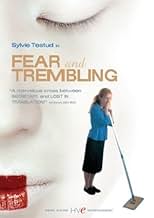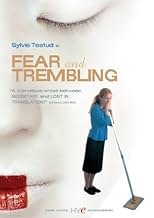Stupeur et tremblements
- 2003
- Tous publics
- 1h 47min
Ajouter une intrigue dans votre langueA Belgian woman looks back on her year at a Japanese corporation in Tokyo in 1990. She is Amélie, born in Japan, living there until age 5. After college graduation, she returns with a one-ye... Tout lireA Belgian woman looks back on her year at a Japanese corporation in Tokyo in 1990. She is Amélie, born in Japan, living there until age 5. After college graduation, she returns with a one-year contract as an interpreter. The vice president and section leader, both men, are boors,... Tout lireA Belgian woman looks back on her year at a Japanese corporation in Tokyo in 1990. She is Amélie, born in Japan, living there until age 5. After college graduation, she returns with a one-year contract as an interpreter. The vice president and section leader, both men, are boors, but her immediate supervisor, Ms. Mori, is beautiful and trustworthy. Amélie's downfall b... Tout lire
- Réalisation
- Scénario
- Casting principal
- Récompenses
- 5 victoires et 2 nominations au total
Avis à la une
Belgian Amelie seems to know Japan and it's culture, but can't help get into trouble by acting "Western" while working in a Japanese office. As the film goes on you see Amelie make mistakes and you get the urge to warn her not to get into trouble. Her sense of absurdity and courageous submittance make her a likable character. The constricted setting in which people don't express their feelings make the internal monologues and narration very functional.
The story is strong, the filming sober and functional, the cast well-picked. A nice experience for anyone who wants to watch a production from outside LA.
By the way, some of the text appearing at the official web site (http://www.cinemaguild.com/fearandtrembling/) as background decoration actually looks like Korean or something. It is definitely not Japanese. I'm not talking about the Katakana characters outside the flash window, but the white background inside the flash window itself, though it is very hard to see on some monitors.
But, whereas this film has its comedic moments, it's not the same kind of comedy as the above, and not just because it was made in Japan, although that helped.
This really is a story about the difficulties in communication and understanding that exist between cultures and, arguably, those differences between Japanese culture and Western are, or can be, daunting.
Happily, the director presents the narrative from the Amelie's (Sylvie Testud) point of view almost exclusively. In doing so, he exposes and satirizes some of the ridiculous situations that do exist in the Japanese workplace, which, in another culture, would also be equally stupid, if not criminal.
Everybody's come up against tunnel vision in a supervisor. And the same goes for professional jealousy between co-workers. The difference with this film is, of course, the fact that Japanese modes of interaction, manager-worker relationships and, most importantly, individual initiative are regarded very differently when compared to similar conditions in an office in New York, London, Sydney or any other major Western city. To take just one example, a Western vice-president these days would be charged with assault if he'd acted in the same way as Omochi (Bison Katayama) did towards Amelie when the toilet paper tray in the men's toilet was empty. The fact that I could still laugh at that scene testifies to the ability of the director to highlight the absurdity of it all.
As you might expect, there's a lot of dialog, almost as much voice-over by Amelie as she thinks and fantasizes and very little in the way of action well, action-fan type action, know what I mean? So, this movie will not appeal to everybody. I really liked it though as I have a soft spot for Japanese culture anyway, having been steeped in martial arts for nearly thirty years.
For me, this was a subtly satisfying slice of life of a Westerner and female to boot -- in Japan. And quite hilarious at times.
The plot involves a Belgian woman (Amelie) who loves Japan (having spent her early childhood there) and who obtains employment at a huge corporation in Tokyo. Through various cultural misunderstandings, she continually gets demoted until her job mainly involves cleaning toilets.
The film depicts late 80's / early 90's Japanese corporate culture as unbelievably hierarchical, brutal, inefficient and de-humanizing. I suspect this was exaggerated, for comic and dramatic effect. And, for the sake of the Japanese people, I hope so.
My only two complaints about Fear and Trembling are (i) the over-use of the voice-over narration to tell the story, and (ii) the fact that we do not get any hint of Amalie's life (or anyone else's life) outside the office.
With respect to the latter point, another commenter noted "In the novel Amelie Nothomb writes : this could be leading to think I had no life outside the office, which is wrong. but for a schizophrenic reason, when I was at job in the 44th floor toilets of the yumimoto company I couldn't think of myself as the same person respected and loved by friends outside."
Overall, it was entertaining, thought-provoking, and by the end, strangely moving. Both my wife and I got a bit misty-eyed at the end - I was a bit surprised that the movie drew such sudden emotion out of me. Definitely worth seeing.
Amelie is hired as a translator for the enormous Yamimoto Corporation and put in the accounting department. She is bright, talented and fluent in Japanese and all goes well at first. Unfortunately, Amelie doesn't fully understand the office culture and protocols. That leads to a series of missteps that result in her receiving increasingly degrading assignments.
Amelie's descent down the corporate ladder provides a fascinating glimpse into Japanese corporate life. It is a place that rewards loyalty, not initiative, where workers are promoted based on time served, not because of accomplishment, and bosses use public humiliation to keep employees in line. Watching the managers at Yamimoto in action you begin to understand why the Japanese economy has been in the dumps for the last 15 years.
Le saviez-vous
- AnecdotesBased on Amélie Nothomb's real-life experience when she was living Japan in her early twenties in the early 1990s . The real-life events narrated in the film took place at the same time than those narrated in Tokyo Fiancée (2014) which depicts Amélie Nothomb's romance with her then-fiancé Rinri. However, Tokyo Fiancée's director Stefan Liberski set his film in the early 2010s.
- GaffesWhen Amélie sorts all GmbH clients in the same folder, her superior explains her that "GmbH is like Ltd in English or SA in French". GmbH is not SA in French, but SARL (Société anonyme à responsabilité limitée).
- ConnexionsFeatures Furyo (1983)
- Bandes originalesGoldberg Variations
(selections)
Written by Johann Sebastian Bach
Performed by Pierre Hantaï, harpsichord
Meilleurs choix
- How long is Fear and Trembling?Alimenté par Alexa
Détails
- Date de sortie
- Pays d’origine
- Sites officiels
- Langues
- Aussi connu sous le nom de
- Fear and Trembling
- Lieux de tournage
- Sociétés de production
- Voir plus de crédits d'entreprise sur IMDbPro
Box-office
- Montant brut aux États-Unis et au Canada
- 126 684 $US
- Week-end de sortie aux États-Unis et au Canada
- 6 007 $US
- 21 nov. 2004
- Montant brut mondial
- 2 305 213 $US
Contribuer à cette page





















